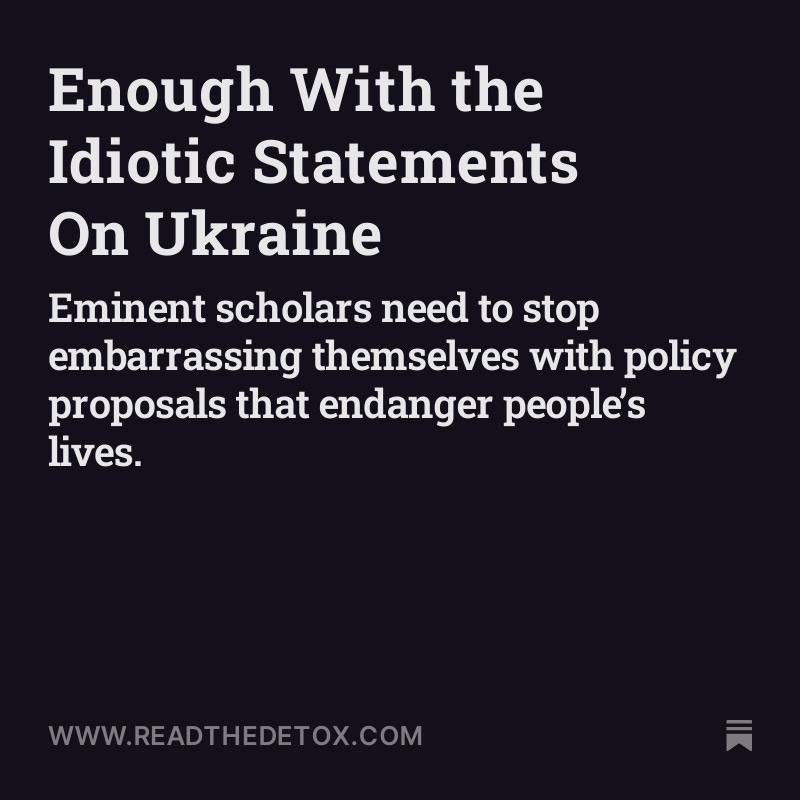A lot of scholars are seemingly hellbent on damaging their reputations with ruinous advice on Ukraine and Russia. The past week alone has seen three open letters from this sorry genre, all of which, if carried out, would put real people’s lives in danger. Let’s take a look.🧵 

As always, you can find the link at the end of this thread or in my bio.
The first two letters are calls for a negotiated settlement between Russia and Ukraine. One of them—I kid you not—was drafted by a guy who was suspended from the UK’s House of Lords for his undisclosed financial ties to the Kremlin.




The second, which for some reason is addressed to the Pope and Dalai Lama, demands a ceasefire and negotiations. It begins as if announcing its own preposterousness: with a disclaimer that “certain prohibited words in Russia” have been blotted out under threat of prosecution. 

Demands for a “peace deal” rest on a fatal flaw, one which is blindly obvious yet seemingly passes right over the heads of its proponents: Any such deal would lead not to peace but to further atrocities upon the Ukrainians consigned to permanent Russian occupation. 

How do I know this? First, Russia *always* subjects occupied populations to atrocities after the end of active hostilities, as evident in its post-Soviet conduct alone. Second, the Kremlin has repeatedly announced it will commit more genocide in any Ukrainian lands it controls. 

Consequently, anyone genuinely interested in peace should be lobbying not for territorial partition but for more arms transfers to help Ukraine expel Russian forces from its territory. This, and only this, will bring peace to the country.
The third and final open letter of the past week adopts a different tack but is no less inimical to peace. It is a call from from dozens of IR specialists, almost none of whom have any expertise on Russia or Ukraine, to reject the prospect of Ukraine’s accession to NATO. 

Not surprisingly, many of the signatories are on record proposing just the kind of “peace deal” described above. Below are a few examples. Given the genocidal implications, such advice is entirely disqualifying.








Having already discredited themselves in this way, they are once again asking us to defer to their supposed expertise. In fact, their most recent missive features all the inanity of their previous ones while having the added defect of resting on mutually-contradictory premises.
Here’s the problem. You can argue that the Kremlin would never take a NATO guarantee to Ukraine seriously. It’s a bad argument, but you can make it if you wish.








You can also argue that the Kremlin would take a NATO guarantee so seriously that it would fight Ukraine to the bitter end. This too is a bad argument, but, again, you are free to make it. 

What you cannot do is make both of these claims in the same statement—and in successive paragraphs, no less. Yet this is precisely what some sixty-odd IR experts have just done.




You may think I’m being insufficiently deferential or even rude with my tone. And I get it. I’m just sick of seeing these scholars who should know better offer boneheaded policy advice on Ukraine which threatens to endanger people’s lives. It’s enough already.
So, seriously, please stop with this b.s. At the very least, run your ideas by some people who have actual expertise on Ukraine and Russia before you put out these sorts of reckless proposals.
Anyway, there’s a lot more in the actual piece, so go take a look if you’re so inclined. Here’s the link:
/end
readthedetox.com/p/enough-with-…
/end
readthedetox.com/p/enough-with-…
Addendum: If you’re a scholar signing statements urging “peace negotiations” or deferring to Russia’s “security interests” in Ukraine, these are the people to whom you would sign over millions of occupied Ukrainians:
https://twitter.com/opolianichev/status/1813204555720761570
Addendum #2: As a reminder, DePetris signed the recent open letter which simultaneously argues that Russia would never take a NATO security guarantee to Ukraine seriously and that it would take such a guarantee so seriously it would fight on endlessly.
https://x.com/DanDePetris/status/1813232633553330604
• • •
Missing some Tweet in this thread? You can try to
force a refresh
















